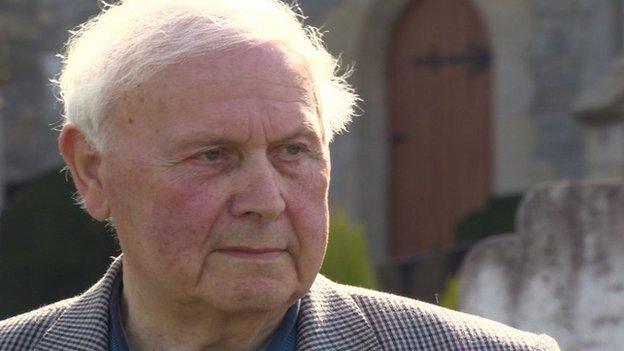Paramilitaries and pensions: 大象传媒 Spotlight looks at controversy over victims
- Published

Ernie Wilson's bus was blown up by the IRA in 1988
It was one of the key points in the Stormont House Agreement - the plan to give the most seriously injured victims of the Troubles a special pension.
It is thought about 400 people in Northern Ireland live with permanent disabilities after surviving gun and bomb attacks.
Those injuries include amputations, paralysis and blindness.
They did get compensation, but they say it is now running out. Some victims now rely entirely on benefits.
Because they could not return to work due to their injuries, they have not built up work-based pension savings.
The Democratic Unionist Party (DUP) is presently preparing a bill to go through Stormont to put a special pension in place for them.
Injured paramilitaries
Current victims' legislation in Northern Ireland from 2006 does not judge how someone became injured.
It is argued that means former paramilitaries should be eligible to get this pension if their injuries are serious enough.
Paul Gallagher was shot six times by loyalist paramilitaries and left paralysed from the waist down
It is thought 10 former paramilitaries fall into this category. More could come forward if the pension scheme goes ahead.
But the DUP say their proposed bill does not need to rely on that current definition of a victim. They plan to exclude anyone with a terrorist conviction.
IRA victims
Ernie Wilson was a school bus driver and member of the Ulster Defence Regiment (UDR).
In 1988, his bus was blown up by the IRA in Lisnaskea. He suffered injuries to his legs and eyes.
He says no paramilitaries should be entitled to the proposed victims' pension.
"My message is pay the people that have been injured by the terrorists. Full stop.
"I know the men that are injured have to live, they have to get food, they have to get clothed, they have to be looked after.
"But they should not be getting a pension for trying to kill me."
Paralysed by loyalists
Yet the 大象传媒's Spotlight programme has learned that the injured paramilitaries have support from some surprising quarters.
Paul Gallagher was 21 when the loyalist Ulster Freedom Fighters (UFF) took over his house with the aim of killing a republican who lived nearby.
When they could not find their target, they shot Paul six times.
He was left paralysed from the waist down.
He told Spotlight that allowing injured paramilitaries to avail of the pension was a price worth paying.
"It's a tough one. Say somebody was seriously injured, even by their own hand, they have needs now. So, I mean, they need to be looked after.
"If they go forward to the NHS they are not going to be turned away at the door.
"So why should they be turned away at the door of maybe the victims and survivors' service or other sorts of services?
"For me, it is as simple as just looking at human suffering really as the qualification for eligibility or even to be recognised as a victim."
Sinn F茅in told Spotlight they would not support the DUP bill if former paramilitaries are to be excluded.
Spotlight was broadcast on 大象传媒 One Northern Ireland on Tuesday 2 June, and is available on the iPlayer.